Coaxial power connector
A coaxial power connector is an electrical power connector used for attaching extra-low voltage devices such as consumer electronics to external electricity. Also known as barrel connectors, concentric barrel connectors or tip connectors, these small cylindrical connectors come in an enormous variety of sizes.
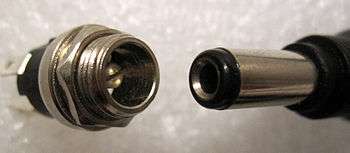
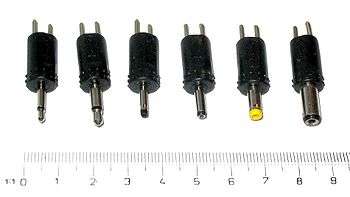
Barrel plug connectors are commonly used to interface the secondary side of a power supply with the device. Some of these jacks contain a normally closed switch; the switch can disconnect internal batteries whenever the external power supply is connected.
Connector construction and terminology
The connector pairs for barrel connectors are defined in terms of 'plugs' and 'receptacles'; receptacles are more commonly called 'sockets' or 'jacks' (US). Receptacles may be panel-mounted or circuit board-mounted. Plugs are on cables. Some 'in-line' receptacles are also cable-mounted.
There is a long history in electrical engineering of referring to such power plugs — that is to say, plugs with holes instead of prongs — as female,[1] particularly regarding coaxial transmission of electricity.[2] Type N connectors,[3][4] and all IEC 60320 "appliance coupler" plugs are examples of this. That said, while IEC 60320 provides gender-based standards for higher-voltage plugs (such as the cable plugged into a standard computer power supply), they have not yet defined gender-based standards for low-voltage coaxial power connectors such as those discussed herein; i.e., which component is "male" and which is "female". As a result, there are varying opinions in this regard. Many industrial suppliers avoid gender terminology[5] but many do not.[6] Similarly, some people view the corded plug as female[7] and some perceive it as male.[8] Some, after consideration and surveys, found that user perception of which was male and which female was evenly split.[9]
Power is generally supplied by a plug to a receptacle. Cables are available with one in-line receptacle fanning out to a number of plugs, so that many devices may be supplied by one supply. As the use of a plug implies a cable, even a short stub, some power supplies carry panel-mounted receptacles instead to avoid this cable, i.e. the normal convention of power from plug to receptacle is reversed. Cables for such cases are available with a plug at each end, although cables or adapters with two receptacles are not widely available.
Plug (female)
On the female plug, the outer body is metallic and cylindrical in shape, and comprises one of the two contacts. The second, inside contact is a hollow metallic cylinder constructed to accept insertion of the pin in the corresponding male connector. The inner and outer barrels are separated by an insulating layer, which is flared at the tip to prevent a short circuit when the plug is inserted or removed.. The outer contact is generally called the barrel, sleeve or ring, and the inner contact is called the tip.
Receptacle (male)
There is typically a single spring-loaded contact at the side of the male connector and a pin in the center corresponding to the intended female plug.
Connector sizes
There are many different sizes of coaxial power connectors (see table at end of this article).
Contact ratings commonly vary from unspecified up to 5 A (11 A for special high-power versions). Voltage is often unspecified, but may be up to 48 V with 12 V typical. The smaller types usually have lower current and voltage ratings.
It is quite possible that new sizes will continue to appear and disappear. One possible reason that a particular manufacturer may use a new size is to discourage use of third-party power supplies, either for technical reasons or to force use of their own accessories, or both.
The sizes and shapes of connectors do not consistently correspond to the same power specifications across manufacturers and models. Two connectors from different manufacturers with different sizes could potentially be attached to power supplies with the same voltage and current. Alternatively, connectors of the same size can be part of power supplies with different voltages and currents. Use of the wrong power supply may cause severe equipment damage, or even fire.
Common sizes and interchangeability
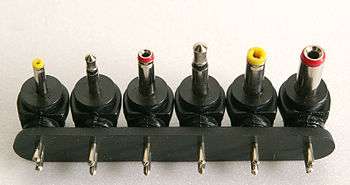
Generic plugs are often described by their inside diameter, such as 2.1 mm DC plugs and 2.5 mm DC (direct current) plugs.
After the two common 5.5 mm OD (Outer Diameter) plugs, the next-most common size is 3.5 mm OD with a 1.3 mm ID (Inner Diameter), usually about 9.5 mm in length, although both longer and shorter versions also exist. These 3.5 mm OD plugs are normally used for lower voltages and currents.
Locking and retention features
A ring-shaped 'locking detent' or 'high-retention feature', present on the barrel of some DC coaxial connectors, is a feature intended to prevent accidental disconnection. Typically, this feature is a conical cut-back section of the tip, just behind the insulator that separates the inner from outer contact surfaces.
A 'lock-ring DC coaxial connector' uses a captive threaded ring or collar to secure the connection between the plug and jack. This design offers strong resistance to unplugging when used properly.
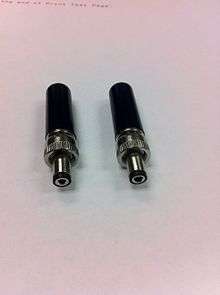
A 'lock-tab DC coaxial connector' (also called 'bayonet lock') offers a compromise that resists unplugging, but which will disengage when pulled hard enough. This connector uses small metal tab protrusions on the connector barrel to lock the plug in place, requiring a special push-and-rotate motion to engage the locks.
Standards
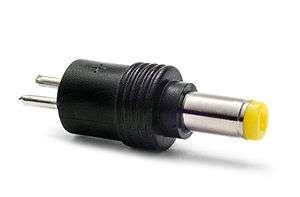
There are several standards in existence, such as IEC, EIAJ in Japan and DIN in Germany. More recently, some manufacturers appear to have implemented their own system correlating voltage and plug size. In addition, there appears to be a trend to standardize DC connector to negative barrel (or sleeve) of a coaxial power connector.
IEC 60130-10
IEC 60130-10:1971 defines five DC power connectors.[10]
- Type A: 5.5 mm OD, 2.1 mm ID (with optional screw lock)
- Type A: 5.5 mm OD, 2.5 mm ID (with optional screw lock)
- Type B: 6.0 mm OD, 2.1 mm ID
- Type B: 6.0 mm OD, 2.5 mm ID
- Type C: 3.8 mm OD, 1.4 mm ID
- Type D: 6.3 mm OD, 3.1 mm ID
- Type E: 3.4 mm OD, 1.3 mm ID
EIAJ power connectors
Five plug and matching socket or jack designs are defined by the EIAJ standard RC-5320A (also called JEITA RC-5320A). Each of these plugs is used with a specified voltage range. Most manufacturers use a yellow insulating material to distinguish these plugs from other similar-looking DC plugs.
- EIAJ-01 for 0–3.15 V 2.5 mm OD, 0.7 mm ID
- EIAJ-02 for 3.15–6.3 V 4.2 mm OD, 1.7 mm ID
- EIAJ-03 for 6.3–10.5 V 5.0 mm OD, 1.7 mm ID
- EIAJ-04 for 10.5–13.5 V (also called JSBP 4) 5.5 mm OD, 3.4 mm ID
- EIAJ-05 for 13.5–18 V (also called JSBP 5) 6.5 mm OD, 4.4 mm ID
EIAJ-04 and 05 have an internal male pin in the plug. The 01 through 03 sizes do not and are similar to the generic plugs in structure. These five EIAJ plugs are 9.5 mm in length and have a current rating of 2A.
There are two other, less common, connectors defined by EIAJ; RC-5321 and RC-5322. The latter is designed for both 12 V and 24 V automotive applications.
DIN 45323
The German national standards organization DIN (Deutsches Institut für Normung—German Institute for Standardization) issued DIN 45323, which defines two DC power plug and jack (respectively) sizes. At least one of these sizes has a maximum rating of 34 V and 3 A. The information here is inferred from catalog references,[11] as the German standard has not been translated into English yet.
- 5.00 mm OD, 2.00 mm ID, 14 mm long?
- 6.00 mm OD, 1.98 mm ID
Listing of DC coaxial connectors
This list attempts to show all known sizes, and is annotated with some manufacturers producing selected types, since each manufacturer makes its own unique subset of the known types. Note that the example part numbers given may have different connector barrel (sleeve) lengths, and are not necessarily exact equivalents. There are many more design variants than can be listed in this table, so only a small sampling of part numbers is given.
Connector size is often listed in the format OD (outer diameter) × ID (inner diameter) × L (length of barrel) and expressed in millimeters. Designations may vary between manufacturers.
Coaxial plugs that have a male center pin will have another measurement, Center Pin Diameter (CPD). These plugs are often used for higher power applications such as portable computers.
There are a number of sizes listed below that appear to be quite similar, and while the tolerances of these connectors are typically indicated as ±0.05 or ±0.03 mm by the manufacturers, there is still ambiguity as to whether two sizes differing by only 0.05 mm (or where the specification is only given to the nearest 0.10 mm) warrants listing them separately here.
| OD (mm) | ID (mm) | CPD (mm) | Barrel length (mm) | Adaptaplug | Standard | Volts | Plug part numbers | Jack part numbers | Notes |
|---|---|---|---|---|---|---|---|---|---|
| 2.00 | 0.60 | used in newer Nokia phones (AC-3) and Bluetooth headphones | |||||||
| 2.35 | 0.70 | 9.5 | A | EIAJ-01 | 0–3.15 V | Kobiconn 3218-EX Lumberg 1636 01 |
Kobiconn 0307-EX (inline) | Canon ACK-800, also used on very old Motorola phones (SPN4364/4365/4366/4474) | |
| 2.40 | 0.70 | Egston 212 | possibly a rounded-off representation of EIAJ-01 | ||||||
| 2.40 | 0.80 | Egston 213 | |||||||
| 2.50 | 0.80 | Used in Samsung Bluetooth headsets and few tablet PCs | |||||||
| 3.00 | 1.00 | ||||||||
| 3.00 | 1.10 | G | CUI Inc. PP-019 Egston 214 |
Used in satellite radio docks and other devices | |||||
| 3.20 | 0.90 | CUI Inc. PP-017 | |||||||
| 3.30 | 1.00 | Motorola AAPN4064A | Used in older Motorola phones (SPN4680/4681/4682/4677/5296A) and also used in some rare Nokia phones (ACH-6) | ||||||
| 3.40 | 1.30 | H | Kobiconn 3210-E | Kobiconn 0309-EX (inline) | |||||
| 3.40 | 1.35 | Egston 218 Medical, 220 | |||||||
| 3.40 | 1.40 | Lumberg NES/J 135 | |||||||
| 3.50 | 0.90 | possible nokia acp-7 charger[12] | used in many older Nokia phones (ACP-12?) | ||||||
| 3.50 | 1.10 | CUI Inc. PP3–002C Philmore 202 |
|||||||
| 3.50 | 1.30 | Egston 238 Philmore 204,2049 |
Kobiconn 0308-EX (inline) Philmore 256 (inline) |
Also used in older Alcatel phones (3DS07008A?AA, 3DS09371A?AA, 3DS10628A?AA) | |||||
| 3.50 | 1.35 | CUI Inc. P7 CUI Inc. PP3–002D Egston 215 Kobiconn PA35135-E |
Also used for Canon CA-570 Charger (Output: 8.4V 2A)[13] | ||||||
| 3.60 | 1.15 | Egston 216 | |||||||
| 3.80 | 1.10 | I | CUI Inc. P9 but with 1.05 mm ID | ||||||
| 3.80 | 1.30 | Egston 217 | |||||||
| 3.80 | 1.35 | CUI Inc. P8 | |||||||
| 4.00 | 1.70 | 9.5 | B | EIAJ-02 | 3.15–6.3 V | Kobiconn 3219-EX Lumberg 1636 02 |
Kobiconn 0311-EX (inline) | Used in Lenovo Flex 4 adapter Used for Sony PSP Charger (Input: 100-240VAC, Output: 5VDC @ 1500mA for PSP 1000, 2000, 3000) | |
| 4.75 | 1.70 | 9.5 | C | EIAJ-03 | 6.3–10.5 V | Kobiconn 3220-EX Lumberg 1636 03 |
Kobiconn 0310-EX (inline) | ||
| 4.75 | ?.?? | 2.5 protruding | C | EIAJ RC-5321 | |||||
| 5.00 | 1.50 | J | |||||||
| 5.00 | 2.00 | DIN 45323? | Egston 206,207,219 | ||||||
| 5.00 | 2.10 | K | CUI Inc. P3 | ||||||
| 5.00 | 2.50 | L | CUI Inc. P4 | ||||||
| 5.50 | 1.50 | S | |||||||
| 5.50 | 1.70 | Used in Acer Aspire V5 adapter and some Hikvision 48V NVRs | |||||||
| 5.50 | 2.10 | M | CUI Inc. P5 CUI Inc. PP3–002A Kobiconn 3217-EX Philmore 210, 210L, 2109 Switchcraft S-760, S-765 |
CUI Inc. PR-002A (inline) Kobiconn 0302 (inline) Philmore 257 (inline) Switchcraft 722A (panel) |
2.1 mm center pin Common on guitar effect pedals | ||||
| 5.50 | 2.10 | CUI Inc. P10 Kobiconn 7391 Philmore 2560 Switchcraft S760K |
2.1 mm center pin, lock-ring | ||||||
| 5.50 | 2.10 | Kobiconn 0721-EX | Kobiconn 1000-EX (panel) | 2.1 mm center pin, lock-tab | |||||
| 5.50 | 2.50 | N | CUI Inc. P6 CUI Inc. PP3–002B Egston 222 Kobiconn 0702-EX Philmore 250, 250L, 2509 Switchcraft 760, 765 |
CUI Inc. PR-002B (inline) Kobiconn 0303 (inline) Philmore 258 (inline) Switchcraft 712A (panel) |
2.5 mm center pin | ||||
| 5.50 | 2.50 | CUI Inc. P11 Kobiconn 7395 Philmore 2560 Switchcraft 760K |
2.5 mm center pin, lock-ring | ||||||
| 5.50 | 2.50 | Kobiconn 0725-EX | Kobiconn 1100-EX (panel) | 2.5 mm center pin, lock-tab | |||||
| 5.50 | 2.80 | O | |||||||
| 5.50 | 3.0 | 5V, 1.5A, Efficiency Level V | Philmore Coaxial Power Plug 3.0mm I.D./5.5mm O.D. No. 206 | Roku 2 XS HDTV Streaming Box | |||||
| 5.50 | 3.30 | 1.00 | 9.5 | D | EIAJ-04, JSBP4 | 10.5–13.5 V | Lumberg 1636 04 | Microsoft Xbox 360 HD DVD drive | |
| 5.50 | 3.80 | 1.80 | P | ||||||
| 6.00 | 1.98 | DIN 45323 | Lumberg 1632 01 | ||||||
| 6.30 | 2.50 | found in an ISP specific modem/router, 12VDC power connector, manufactured by Compal, unknown standard | |||||||
| 6.30 | 3.00 | Q | Icom R75, R8500 | ||||||
| 6.50 | ?.?? | EIAJ RC-5322 | |||||||
| 6.50 | 3.00 | Used in Yamaha keyboard power supply | |||||||
| 6.50 | 3.10 | 1.00 | Philmore 285 | ||||||
| 6.50 | 3.40 | 1.40 | 9.0 | 18 VDC @5A | Kobiconn 6014-E | used often for laptop computers | |||
| 6.50 | 4.10 | 1.00 | U | JEITA RC-5322 | 24 VDC @ 2A | Lumberg 1636 06 | Epson Photo Scanners V600 etc. | ||
| 6.50 | 4.30 | 1.40 | T | EIAJ-05, JSBP5 | 13.5–18.0 V | Lumberg 1636 05 Philmore 265 CUI Inc. PP-016 |
Philmore 214 CUI Inc. PJ-025 |
OD is of ring at tip Common for Sony laptops and scanning radios | |
| 6.90 | 4.20 | 0.70 | R | ||||||
| 7.00 | ?? | 1.00 | Philmore 48-412 | ||||||
| 7.4 | 5.1 | 12.5 | Mini-ITX motherboards (e.g. Intel DH61AG, Asus H310T) | ||||||
| 7.4 | 5.5 | 0.5 | 12.5 | Some Asus, Dell, HP, Sony laptops.
Dyson hand-held vacuum cleaners |
RadioShack Adaptaplug
RadioShack sold a line of adapter plugs for universal AC adapters. Each "Adaptaplug" had a single-letter code, but did not provide any other official designation, nor did RadioShack publish the complete specifications and tolerances on barrel and pin dimensions. RadioShack's web site listed the diameters to the nearest 0.1 mm, and sometimes differs slightly from the official EIAJ RC-5320A standard dimensions. This list may include some parts RadioShack has discontinued but are retained here for completeness.[14]
| Adaptaplug | Outside
diameter |
Inside
diameter |
Pin
diameter |
Standard
type |
Voltage
range |
Ring
color |
Radio Shack
catalog number |
|---|---|---|---|---|---|---|---|
| A | 2.3 mm | 0.7 mm | EIAJ-01 | < 3.15 V | Yellow | 273-1704 | |
| B | 4.0 mm | 1.7 mm | EIAJ-02 | 3.15 – 6.3 V | Yellow | 273-1705 | |
| C | 4.7 mm | 1.7 mm | EIAJ-03 | 6.3 – 10.5 V | Yellow | 273-1706 | |
| D | 5.5 mm | 3.3 mm | 0.9 mm | EIAJ-04 | 10.5 – 13.5 V | Yellow | 273-1707 |
| E | 2.5 mm (3/32" submini plug) | Black | 273-1708 | ||||
| F | 3.5 mm (1/8" mini-phone plug) | Black | 273-1709 | ||||
| G | 3.0 mm | 1.1 mm | Turquoise | 273-1710 | |||
| H | 3.4 mm | 1.3 mm | IEC 60130-10 Type E | Orange | 273-1711 | ||
| I | 3.8 mm | 1.1 mm | IEC 60130-10 Type C | Pink | 273-1712 | ||
| J | 5.0 mm | 1.5 mm | Red | 273-1713 | |||
| K | 5.0 mm | 2.1 mm | Purple | 273-1714 | |||
| L | 5.0 mm | 2.5 mm | Dark Green | 273-1715 | |||
| M | 5.5 mm | 2.1 mm | IEC 60130-10 Type A | Navy | 273-1716 | ||
| N | 5.5 mm | 2.5 mm | IEC 60130-10 Type A | White | 273-1717 | ||
| O | 5.5 mm | 2.8 mm | Brown | 273-1718 | |||
| P | 5.5 mm | 3.8 mm | 1.8 mm | Not Specified | 273-1719 | ||
| Q | 6.3 mm | 3.0 mm | Yellow-Green | 273-1720 | |||
| R | 6.9 mm | 4.2 mm | 0.7 mm | Not Specified | 273-1721 | ||
| S | 5.5 mm | 1.5 mm | Gray | 273-1722 | |||
| T | 6.5 mm | 4.3 mm | 1.4 mm | EIAJ-05 | 13.5 – 18.0 V | Yellow | 273-1723 |
| U | 6.5 mm | 4.1 mm / 3.10 mm | 1.0 mm | IEC 60130-10 Type D? | Light Yellow | 273-1724 |
See also
- AC adapter
- Anderson Powerpole
- Cigarette lighter receptacle
- DC connector
- Gender of connectors and fasteners
References
- Meschenmoser, William. "Entry for Patent US1157026A". Google Patents. Retrieved 8 September 2016.
- Quackenbush, Edward Clarke. "Entry for Patent US2422982A". Google Patents. Retrieved 8 September 2016.
- Kuester, Edward. "Common Coaxial Connectors".
- "Power Connectors". Retrieved 8 September 2016.
- "DC Barrel Connectors". CPC Farnell.
- "Barrel Power Connectors". Digi-Key.
- "Coaxial Power Plug Connectors".
- "Barrel Connectors". Sparkfun.
- "What Was The Connector Gender?". Jameco Electronics.
- "Connectors for frequencies below 3 MHz. Part 10: Connectors for coupling an external low-voltage power supply to portable entertainment equipment". IEC. 1 January 1971. IEC 60130-10 ed1.0. Retrieved 18 April 2012.
- Lumberg Connect GmbH. "Power supply connectors". Retrieved 23 March 2011.
- http://podolsk.pro/for-mobile/Nokia/10-nsb-8-acc.pdf
- "AOK For Canon Camera- AC Adapter CA-570, 8.4V 2A, (1.35/3.5mm), (2-prong) [AOK For Canon Camera- AC Adapter] ,Cheap High quality AOK For Canon Camera- AC Adapter CA-570, 8.4V 2A, (1.35/3.5mm), (2-prong) [AOK For Canon Camera- AC Adapter] : Laptop Parts Supplier, Laptop Parts Repair". www.allpoweradaptor.com. Retrieved 15 June 2020.
- "RadioShack". support.radioshack.com.
External links
- Guide to Understanding Power Conversion, RadioShack
- Datasheets (drawings and dimensions)